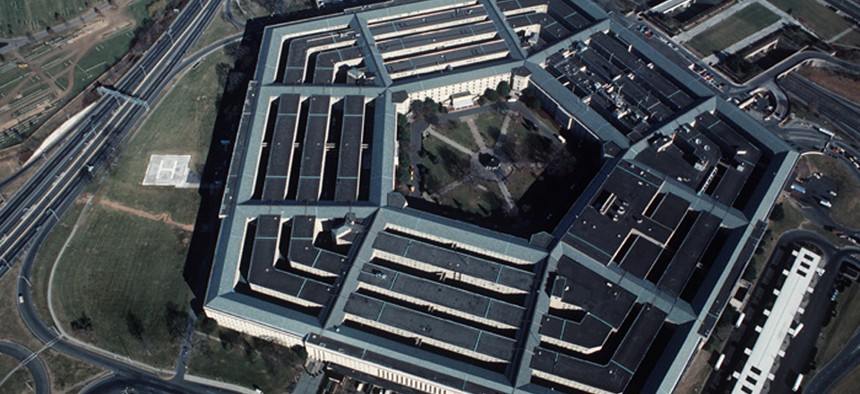
Defense Department file photo
Deja Vu? Pentagon at Odds With Union on Its Second Attempt at Civilian Personnel Reform
Union feels 'duped' and 'boxed out' of the process for creating a new system.
The last time the Defense Department tried to overhaul its personnel system, it was, by most accounts, a disaster.
The National Security Personnel System, created during the George W. Bush administration to more closely tie pay to performance and duties, was dismantled just a few short years after it was implemented in 2006. Now, the Pentagon is seeking to learn from those mistakes as it engages with employees, labor groups and other stakeholders to reform the way its civilian employees are evaluated and compensated.
Defense’s new structure will establish a three-level performance appraisal system for “the vast majority” of its 750,000 civilian employees, Lt. Cmdr. Nate Christensen told Government Executive on Thursday. It will attempt to better connect performance expectations to department-wide goals, and to boost communication between employees and the supervisors rating them. It will also link bonuses to performance.
“We believe that such a program is critical to effective mission accomplishment, as well as increased employee engagement, morale and effectiveness,” Christensen said.
The Pentagon this week released a biannual report providing Congress with an update on the progress toward implementing the new plan, which was required under the 2010 National Defense Authorization Act. Defense officials met several times with labor groups in the first half of 2014 to review the system, during which the agency “made significant progress,” according to the report.
A representative at those meetings on behalf of the American Federation of Government Employees -- a union with hundreds of thousands of Defense civilians as members -- however, said the department’s take on the collaboration was greatly exaggerated.
“We’ve been duped is what happened,” said Don Hale, chair of AFGE’s Defense Conference. “We’ve been boxed out of the last part of the process.”
The 2010 authorization act, which repealed the failed NSPS, required Defense, in coordination with the Office of Personnel Management, to create a “fair, credible and transparent system for linking employee bonuses and other performance-based actions to performance appraisals of employees.”
The 2010 law also said the new system should create “meaningful distinctions in performance” used to inform personnel decisions, promote a “high-performance culture,” and establish retention incentives for top performers by ensuring they do not get laid off during reductions in force. The best employees should ultimately receive not just bonuses and recognition, Congress said, but also promotions, training and development opportunities.
Christensen said Defense has worked with OPM to create its appraisal system, which will include the levels of “superior,” “successful,” and “unacceptable.” The agency is also developing training programs for supervisors, as well as a more skilled human resources workforce that can help advise management.
The act also required, however, that any changes be negotiated with affected labor groups. That process began with “design teams” made up of union representatives and Defense management, which submitted recommendations to the department. The Pentagon rejected 11 of the teams’ suggestions, most notably that the appraisal system should only have two tiers.
“You’re either good enough to come back to work tomorrow or you’re not,” Hale said.
Defense’s insistence on a three-tier system and other changes not backed by the unions reinvigorated the groups to bargain throughout the implementation process, but they say they have been given little opportunity to do so. Hale said one of the meetings the Pentagon boasted about in its latest progress report lasted just 15 minutes.
“We wanted to be part of the process,” he said. “We wanted to write some of the policies and procedures that would be used to implement these recommendations.”
The department has not yet finalized a timetable to implement its overhaul, but plans to phase in the changes.
For its part, AFGE plans to fight the implementation every step of the way -- once it determines what there is to fight.







